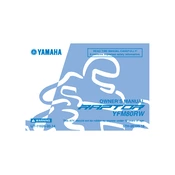Yamaha YFM80RW Raptor 2007 Owner's Manual


For the Yamaha YFM80RW Raptor 2007, use Yamalube 4-stroke oil or an equivalent 10W-40 oil that meets or exceeds the JASO MA standard.
The air filter should be inspected every 20 hours of operation or monthly, and cleaned or replaced as necessary to ensure optimal performance.
The recommended tire pressure for the front tires is 4.4 psi (30 kPa) and for the rear tires is 3.6 psi (25 kPa).
Check the battery connection, ensure the fuel valve is open, inspect the spark plug for fouling or damage, and make sure the engine stop switch is in the 'Run' position.
Loosen the rear axle nut, adjust the chain adjusters on both sides evenly until the desired tension is achieved, and then retighten the axle nut.
Regularly inspect the brake pads for wear, check the brake fluid level, and ensure the brake cables are properly adjusted and lubricated.
Regular maintenance includes oil changes every 6 months or 100 hours, checking and cleaning the air filter, inspecting the brakes, checking tire pressure, and lubricating all pivot points.
Remove the spark plug cap, use a spark plug wrench to remove the old plug, check the gap on the new spark plug, and install it by tightening to the recommended torque.
Common issues include battery drainage, faulty connections, and blown fuses. Regular inspection and cleaning of connections can prevent these problems.
Improving performance can be achieved by upgrading the exhaust system, using high-quality air filters, and ensuring regular maintenance to keep the engine running efficiently.